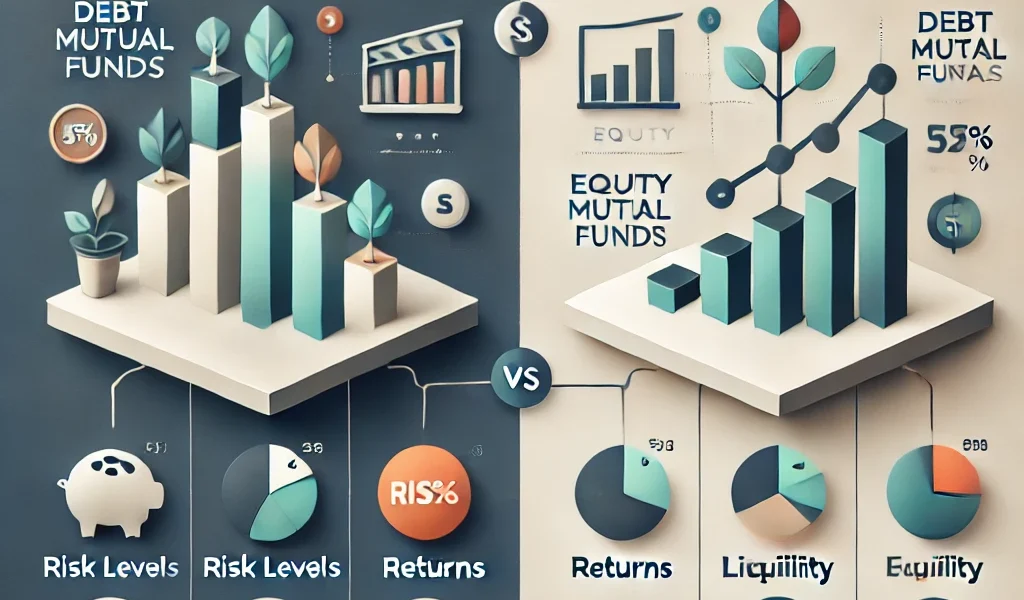Mutual funds are one of the most popular investment options for individuals looking to grow their wealth over time. Among the different types of mutual funds, debt and equity funds stand out as two primary categories. While both serve distinct financial goals, understanding their differences, risks, and returns is crucial in making an informed investment decision.
This article will provide a comprehensive comparison between debt and equity mutual funds, helping you determine which one suits your financial objectives best.
What Are Debt Mutual Funds?
Debt mutual funds invest in fixed-income securities such as government bonds, corporate bonds, treasury bills, and other money market instruments. These funds aim to provide stable returns with lower risk compared to equity funds.
Key Features of Debt Mutual Funds:
- Lower Risk: Debt funds are generally considered less risky than equity funds as they invest in fixed-income instruments.
- Stable Returns: Since they invest in government and corporate bonds, they offer relatively stable returns.
- Short to Medium-Term Investment: Debt funds are ideal for investors with short to medium-term financial goals.
- Taxation: If held for more than three years, long-term capital gains (LTCG) tax applies with indexation benefits.
Types of Debt Mutual Funds:
- Liquid Funds: Suitable for short-term investments (up to 91 days), offering higher returns than savings accounts.
- Short-Term Debt Funds: Investments in bonds with shorter durations, ideal for those seeking moderate risk with better returns than fixed deposits.
- Long-Term Debt Funds: Best for investors looking for a stable income over an extended period.
- Gilt Funds: Invest in government securities and are considered very safe.
- Corporate Bond Funds: Invest in high-rated corporate bonds and offer better returns than government securities.
What Are Equity Mutual Funds?
Equity mutual funds primarily invest in stocks or shares of companies. These funds aim to generate higher returns over the long term but come with increased market risks.
Key Features of Equity Mutual Funds:
- Higher Risk, Higher Returns: These funds are linked to stock market performance and have higher return potential compared to debt funds.
- Long-Term Investment: Suitable for long-term wealth creation (minimum 5-7 years).
- Taxation: Long-term capital gains (LTCG) tax is applicable for holdings above ₹1 lakh after one year at 10%, while short-term capital gains (STCG) are taxed at 15% if held for less than one year.
Types of Equity Mutual Funds:
- Large-Cap Funds: Invest in well-established companies with stable growth and lower risk.
- Mid-Cap Funds: Invest in medium-sized companies with growth potential but moderate risk.
- Small-Cap Funds: Invest in emerging companies with high risk and high reward potential.
- Sectoral/Thematic Funds: Invest in specific sectors like technology, healthcare, or banking.
- Index Funds: Passive funds that replicate market indices such as the S&P 500 or Nifty 50.
Debt vs. Equity Mutual Funds: A Side-by-Side Comparison
| Features | Debt Mutual Funds | Equity Mutual Funds |
|---|---|---|
| Risk Level | Low to Moderate | High |
| Returns | 5-8% (approx.) | 10-15%+ (approx.) |
| Investment Horizon | Short to Medium-Term | Long-Term |
| Liquidity | High | Moderate to High |
| Best Suited For | Conservative Investors | Aggressive Investors |
| Tax Benefits | Indexation for LTCG after 3 years | 10% LTCG tax over ₹1 lakh |
Which One Should You Pick?
Choose Debt Mutual Funds If:
- You want lower risk with stable returns.
- Your investment horizon is short to medium-term.
- You need liquidity and predictable income.
- You prefer lower volatility in market fluctuations.
Choose Equity Mutual Funds If:
- You have a high-risk appetite and seek higher returns.
- Your investment horizon is long-term (5+ years).
- You aim for wealth creation and capital appreciation.
- You are comfortable with market fluctuations.
A Hybrid Approach: The Best of Both Worlds
If you are unsure about investing solely in debt or equity funds, hybrid funds offer a balanced approach. These funds invest in both asset classes to manage risk and optimize returns. Popular types include:
- Balanced Advantage Funds: Dynamically adjust equity and debt exposure based on market conditions.
- Aggressive Hybrid Funds: Invest majorly in equities while maintaining some debt exposure.
- Conservative Hybrid Funds: Invest more in debt instruments with limited equity exposure.
Final Thoughts
Debt and equity mutual funds serve different investment needs. If stability and lower risk are your priority, debt funds are a great choice. However, if you seek higher returns and can tolerate market volatility, equity funds are the way to go.
Assess your financial goals, risk tolerance, and investment horizon before making a decision. For beginners, a mix of both can provide a balanced portfolio. Consulting a financial advisor can also help in making the right choice based on your individual requirements.




